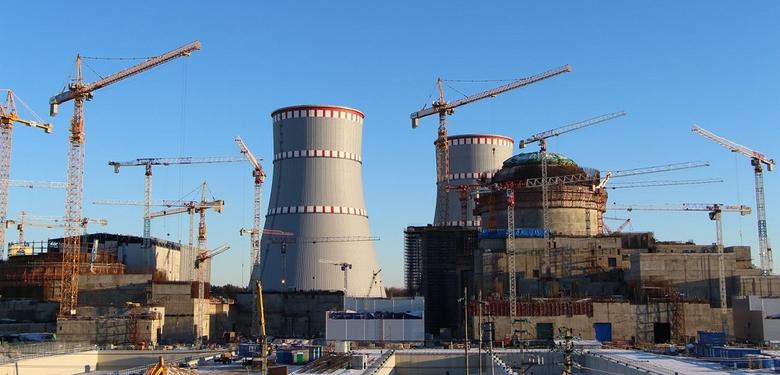
BANGLADESH'S FIRST NUCLEAR

IAEA - Dhaka and Rooppur, Bangladesh — As 2019 starts, authorities in Bangladesh have presented in Vienna this week their progress towards nuclear power at a Technical Meeting on Topical Issues in the Development of Nuclear Power Infrastructure, with more than one hundred participants from 40 IAEA Member States.
This country of 160 million plans to produce 9% of its electricity from nuclear power and reduce its dependence on fossil fuels by the middle of the next decade when both reactors of the new power plant will have gone into operation.
"By 2040 we estimate that Bangladesh will need to generate about 78 000 megawatt of electricity in a high-demand scenario and about 69 000 in a low one, and nuclear power will play a significant role," said Mohammad Shawkat Akbar, Project Director of the nuclear power plant construction project and Managing Director of Nuclear Power Plant Company Bangladesh Limited, an enterprise of the Bangladesh Atomic Energy Commission (BAEC).
This, Akbar said, is according to the revised Power System Master Plan for Bangladesh from 2016. "We are confident that the first unit will be commissioned in 2023 and the second in 2024," he said.
The plant, being built in Rooppur, about 160 kilometers northwest of the capital, will have the capacity to generate 2400 megawatts of electricity.
The construction project is being implemented by a subsidiary of Russia's State Atomic Energy Corporation ROSATOM. It is high on the Bangladeshi government's agenda, all the way up to the Prime Minister's office.
Bangladesh is expected to be one of the countries to suffer the most from climate change. The Intergovernmental Panel on Climate Change (IPCC) anticipates that sea level rise from climate change is expected to subsume a large portion of its coastal land by 2080.
The government has designed several national policies and actions to adapt to this threat. These focus on food security and health, as well as on energy security — an area where the construction of the nuclear power plant in Rooppur, which is not in coastal land, is expected to help.
"All site-specific conditions, including protection from flooding and earthquakes, had to be addressed before getting the relevant licenses," said Naiyyum Choudhury, Chairman of the Bangladesh Atomic Energy Regulatory Authority.
IAEA help
Since Bangladesh expressed interest in embarking on a nuclear power programme, the IAEA has been assisting the country through its technical cooperation programme and Peaceful Uses Initiative. This support includes assistance with reviewing nuclear laws, preparing for adhering to international legal instruments, developing and reviewing regulations, assessing sites and developing a radioactive waste management system.
"A big challenge in such a complex project is building capacities," Akbar said. "And this is an area where the IAEA can immensely help." Several IAEA review missions, workshops, training courses and scientific visits have supported in building national capacity and nuclear knowledge.
The IAEA will continue to support the country in the areas of safety, regulatory framework, management, human resource development, security, safeguards and emergency planning. This is what participants agreed during a consultancy meeting held in Vienna last month between IAEA and Bangladeshi officials to review progress made and plan further support in 2019-2021.
In November 2011, the IAEA conducted an Integrated Nuclear Infrastructure Review (INIR) of the country, making recommendations on how to develop a plan to establish the nuclear infrastructure. Nearly five years later, in May 2016, a follow-up mission of experts noted the progress made: Bangladesh had established a nuclear regulatory body, chosen a site for the power plant and completed the site characterization and environmental impact assessment.
"Our assistance to embarking countries is small, but strategic," said John Haddad, a nuclear engineer at the IAEA. "We provide capacity building through scientific visits, fellowships, and training courses; we provide guidance, documents, review missions and offer a platform for them to share experiences."
-----
Earlier:

2019, January, 18, 10:25:00
BANGLADESH'S NEW ENERGYPLATTS - Bangladesh is planning to step up efforts to liberalize its gas and LNG sectors from 2019 in order to boost private investment and enhance energy security, a move that would likely increase domestic downstream competition and affect the competitiveness of existing oil-linked LNG supply contracts. |

2018, November, 2, 11:50:00
BANGLADESH'S GAS DEMAND UPPLATTS - Bangladesh's natural gas demand projection for fiscal year ending June 2019 has been revised up 8.5% to 1.35 Tcf on rising LNG imports, state-owned Petrobangla's general manager for production and marketing Anwarul Islam said |

2018, October, 26, 12:25:00
OMAN'S LNG FOR BANGLADESHPLATTS - Bangladesh is expecting first lean LNG imports from Oman Trading International from May 2019, as part of a sales and purchase agreement signed in May 2018 for 1 million mt/year of LNG over 10 years, managing director with state-owned Rupantorita Praktritik Gas Company Md Quamruzzaman said |

2018, October, 22, 11:25:00
BANGLADESH LNG STOPPEDPLATTS - Bangladesh has terminated talks with Indian utility Reliance Power to build a new floating storage and regasification unit for LNG imports at Kutubdia Island near Chattogram port, a senior official at the LNG Cell said Thursday. |

2018, September, 10, 12:25:00
BANGLADESH LNG ENERGY: $3 BLNPLATTS - Germany's Siemens AG and Bangladesh's state-run North-West Power Generation Company Ltd Friday signed a joint development agreement to develop a 3,600 MW power plant at Payra in southern Bangladesh that will run on regasified LNG. |

2018, August, 20, 14:05:00
MITSUBISHI BUYS 25% BALNGADESH LNGPLATTS - Japan's Mitsubishi has agreed to acquire a 25% interest in Bangladesh's Summit LNG import project, which includes a floating, storage and regasification unit, with the remaining 75% held by Summit Corporation, the Japanese LNG trader said in a statement late last week. |

2018, March, 4, 11:00:00
РОССИЯ - ИНДИЯ - БАНГЛАДЕШ: АЭС "РУППУР"РОСАТОМ - МОСКВА, 1 марта 2018 года – Госкорпорация «Росатом», Министерство науки и технологий Народной Республики Бангладеш и Департамент по атомной энергии Правительства Республики Индия подписали Меморандум о взаимопонимании по сотрудничеству в реализации проекта сооружения АЭС «Руппур» в Бангладеш. |









